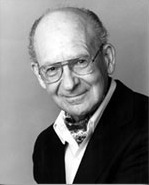 When I began studying with Aaron Shearer as an 18 year old freshman, I was already a professional guitarist. My main job was playing a Vivaldi concerto for the Joffrey Ballet, and I missed much of my first semester doing a tour of Russia. Shearer was unimpressed. He told me that I was playing the guitar all wrong, and that I would have no future unless I cut off my nails, stopped everything I was doing and learned his method by beginning with basic strokes. I was not reassured to learn that this wasn’t personal – in Pedagogy Class he told us that students had to first be broken down: the bigger the attitude, the bigger the fall. I had some attitude, and spent a year resisting him in every way possible. In my second year I finally relented, and I spent the most miserable year of my life-the only year not filled with making music – working on nothing but technique. I got my musical nutrition through constant listening, and did everything Shearer said.
When I began studying with Aaron Shearer as an 18 year old freshman, I was already a professional guitarist. My main job was playing a Vivaldi concerto for the Joffrey Ballet, and I missed much of my first semester doing a tour of Russia. Shearer was unimpressed. He told me that I was playing the guitar all wrong, and that I would have no future unless I cut off my nails, stopped everything I was doing and learned his method by beginning with basic strokes. I was not reassured to learn that this wasn’t personal – in Pedagogy Class he told us that students had to first be broken down: the bigger the attitude, the bigger the fall. I had some attitude, and spent a year resisting him in every way possible. In my second year I finally relented, and I spent the most miserable year of my life-the only year not filled with making music – working on nothing but technique. I got my musical nutrition through constant listening, and did everything Shearer said.
As difficult as it was, I am very happy today that I went through that year. Getting down to mechanical basics was invaluable for a lifetime of playing the guitar and teaching. And in retrospect, I look at Shearer’s inflexible stance with me as quite compassionate and, in fact, personal, because he fought off all my resistance. What I found most valuable in Shearer’s work was his understanding of the learning process, and specifically his insistence on the power of habit. I have found that borne out time again in my work and in my students.
Aaron Shearer was a lone wolf, a figure from the rural west with simple musical tastes. Because of an early hand injury, he went on an investigation into the mechanics of playing the guitar the likes of which no one was doing at that time in this country. He was from the generation of American mavericks that we are seemingly losing by the day now, who, by the force of indomitable will, with little financial or communal support, carved a path out of granite. My relationship with him was complex and sometimes difficult, as it has been with all the mavericks I’ve been lucky enough to know. He was willfull and stubborn, but he had to be to create something out of nothing. He was this country’s most important guitar pedagogue, and he left an indelible mark.
« Back to Personal Losses | Elias Tanenbaum Eulogy | Thoughts on Jorge»